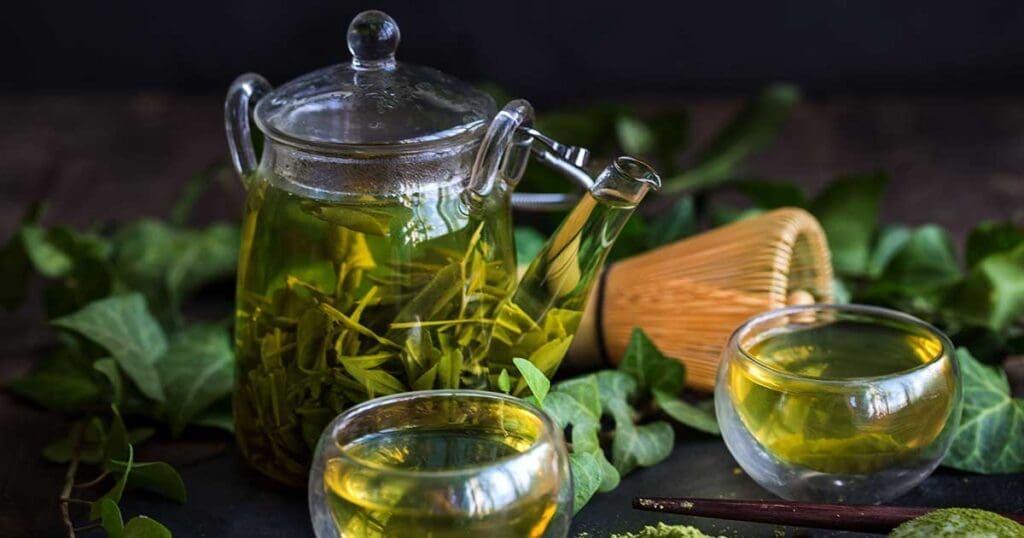As we become more aware of our buying power, knowing about fair trade and organic tea is key. Every second, 70,000 cups of tea are enjoyed, making our choices matter a lot. Fair trade tea helps farmers get a fair price for their work, ensuring they can live better. Organic tea, on the other hand, is good for the planet and our health. So, why is fair trade and organic tea so vital, and how can we make smart choices?
It’s not just about the taste; it’s about the good it does. Organic tea has more antioxidants, which can help prevent diseases. Fair trade helps farmers and their communities, creating a stable economy. By picking fair trade and organic tea, we support farming that’s kind to the earth and fair to workers. This helps build a better world for everyone.
What is Fair Trade Tea?
Fair trade tea is made and sold with fair prices and good working conditions. It helps farmers and workers earn a fair living. This is done through fair trade practices that focus on honesty and fairness in the supply chain. By picking fair trade tea, we support these values and help make the tea industry fairer.
According to Fairtrade International, fair trade ensures fair prices and safe working conditions. This is key for tea farmers, who often struggle to make a living.
One big plus of fair trade tea is it supports sustainable tea production. Tea makers use green farming methods to make top-notch tea. Fair trade also means safe workplaces for tea producers, fixing safety issues in many tea-growing places. Companies like JusTea are at the forefront of fair trade certification, making sure all their teas meet fair-trade standards.
The Role of Certification in Fair Trade
Certification is key in the tea industry to ensure fair trade. Fair trade certification means farmers get fair prices and good working conditions. It also ensures they have sustainable livelihoods.
When you choose certified fair trade tea, you know it comes from farms that follow these rules. Organizations like Fairtrade International and Fair Trade Certified oversee this process.
These certifying organizations make sure fair trade standards are followed. They provide a transparent supply chain for consumers. Independent auditors, like FLOCERT, check if farms meet these standards.
Producers must get the Fairtrade Minimum Price and Premium to be certified. This helps protect their livelihoods.
The value of a transparent supply chain is huge. It lets consumers know what they’re buying. Supporting fair trade certified tea helps farmers and their communities.
Thanks to certifying organizations, the fair trade movement is making the tea industry better. It’s working towards a more just and sustainable future.
Understanding Organic Tea
Organic tea is made without synthetic pesticides, herbicides, or fertilizers. This makes it a better choice for health and the planet. Choosing organic tea means less exposure to harmful chemicals and supports sustainable tea production.
Organic tea farms are often smaller, leading to greener practices. They use compost to keep soil healthy. This method keeps workers safe and helps ecosystems thrive.
The perks of organic tea are many. It cuts down on harmful chemical exposure. Organic farming uses natural pest control, adding to its health benefits. Supporting organic tea helps the environment and promotes fair trade.
Buying organic tea helps make our food system better. More tea brands are now selling organic options. Look for Fair Trade and Organic certifications to know your tea is sustainably made.
The Connection Between Fair Trade and Organic Tea
Fair trade tea and organic tea aim to make the tea industry better. They focus on sustainability and fairness. By picking these teas, we help make the industry more just and green. Sustainable tea production is key, ensuring tea is made without harming the environment or workers.
Both fair trade and organic tea care about the planet. Organic tea is grown without harmful chemicals, keeping ecosystems healthy. Fair trade tea makes sure farmers get paid fairly, helping them escape poverty. The Global Living Wage Coalition says fair trade tea pays more, with organic tea getting even more.

Fair trade and organic tea share important values. They both stand for fairness, sustainability, and caring for the environment. By choosing these teas, we support a better tea industry. JusTea, a Fair Trade Federation member, says fair trade tea helps farmers and the planet.
In summary, fair trade and organic tea are closely linked. They help make the tea industry more sustainable and fair. With the tea industry producing over 4.5 million tons a year, our choices matter a lot. As more people learn about fair trade and organic tea, demand will rise. This will help create a greener and fairer tea industry for everyone.
How Fair Trade and Organic Practices Impact Communities
Fair trade and organic farming help communities a lot. They bring socioeconomic benefits and aid in community development. When we choose fair trade and organic tea, we help local farmers and workers. This supports a fair and green tea industry.
Fair trade helps farmers and workers live better. For example, the Fairtrade Minimum Price helps farmers. It gives them a steady income and access to credit. This means they can afford food and invest in their future.
Fair trade also supports educational and health initiatives. The Fairtrade Premium lets farmers and workers improve their communities. They can get better healthcare and education. This makes communities healthier and more prosperous.
Groups like the Ethical Tea Partnership push for fair trade and green farming in tea. By backing these efforts, we help make the tea industry better. This benefits the environment and the people who grow tea.
Popular Varieties of Fair Trade and Organic Tea
There are many options for fair trade and organic tea. Brands like JusTea, Numi, and Equal Exchange offer a variety of flavors. You can choose from green tea, black tea, herbal infusions, and more. By picking fair trade and organic tea, you support sustainable farming and fair labor.
Popular choices include green tea for its light taste and black tea for its rich flavor. Herbal teas like peppermint and chamomile are great for those who don’t want caffeine. Top brands make it easy to find a tea that fits your taste.

Fair trade and organic tea also has health benefits. Organic tea is grown without harmful chemicals, which is better for the environment. Fair trade tea helps producers earn fair wages, helping them out of poverty. Choosing fair trade and organic tea means you’re supporting good practices.
With so many choices, finding the right fair trade and organic tea is easy. Whether you prefer traditional black tea or a unique herbal infusion, there’s something for everyone. Try it out and see the difference it can make.
How to Choose Fair Trade and Organic Tea
Choosing fair trade and organic tea is easy with a few steps. Start by reading labels and looking for credible brands. This helps support fair and organic practices in the tea industry. Fair trade certification ensures farmers get fair wages, helping them out of poverty.
Organic tea is grown without harmful chemicals. This means no synthetic fertilizers or pesticides. Brands like JusTea, Clipper, and Green & Black’s focus on organic and fair trade. By picking these brands, you support a better tea industry.
Knowing the difference between organic and non-organic tea is key. Organic farms are smaller and use natural methods like composting. This makes the tea taste better and is better for the environment. As more people choose fair and organic tea, they help make the industry better for everyone.
The Environmental Impact of Fair Trade and Organic Tea
Fair trade and organic tea focus on sustainable farming practices. These practices lead to big environmental wins. By picking fair trade and organic tea, we help farmers use fewer chemicals and protect nature.
Choosing these teas also helps fight problems like soil loss, water pollution, and losing species. It’s a big step towards making tea farming better for our planet.
The goal of sustainable tea production is to cut down on the environmental harm tea making causes. It means using fewer chemicals, which keeps our water clean and protects animals. Organic farming also helps nature get stronger against climate change.

But there’s more to it than just the environment. Fair trade and organic tea also help farmers get fair prices and work in better conditions. This way, both people and the planet win.
By choosing sustainable tea, we help make the tea industry greener and fairer. It’s a way for us to make a positive change in the world, one cup at a time.
The Future of Fair Trade and Organic Tea
The future offair tradeandorganic tealooks bright. More people want to buy products that are good for the planet and fair to workers. This shift towardsconscious consumerismis changing the tea industry.
Big tea brands are now focusing on sustainable farming and clear supply chains. They’re also making morefair tradeandorganic teaavailable. New tech like blockchain is helping to prove that these teas are really fair and organic.
But, the tea industry has some big challenges ahead. It needs to make sure farmers get a fair share of the profits. It also has to deal with the effects of climate change. Working together, everyone involved in the tea world can make a difference.
As more people look for ethical and green tea, the industry will keep improving. By choosingfair tradeandorganic tea, we can help make the tea world better for everyone.




Facebook Comments